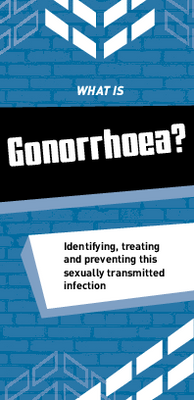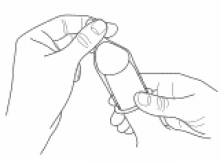What is Gonorrhoea? - HE1442

Identifying, treating and preventing this sexually transmitted infection
The full resource:
What is gonorrhoea?
Gonorrhoea is a common sexually transmitted infection (STI), and is particularly common in people aged less than 25 years. It affects the genitals, the anus or the throat. Gonorrhoea is very easy to catch, but is also very easy to treat. If it is not treated, it can lead to serious health complications.
How do you get it?
You can get gonorrhoea by having sexual contact with someone who has the infection. This includes having contact with their genital fluids or by having vaginal, anal or oral sex.
Gonorrhoea can also be passed on to a baby during childbirth. If you are pregnant, talk to your doctor or midwife.
Signs and symptoms
Men are more likely than women to have symptoms of gonorrhoea. Men may have some or all of the following:
- unusual discharge (fluid) from the penis
- pain when peeing
- sore or swollen testicles
- discharge or bleeding from the anus.
Women often have no symptoms, but may experience some or all of the following:
- unusual discharge (fluid) from the vagina
- pain when peeing
- bleeding between periods
- tummy pain
- discharge or bleeding from the anus.
What if I have symptoms?
If you have symptoms, visit your doctor, your student health or youth clinic or a Sexual Health Services or Family Planning clinic straight away. They will look at the affected area, talk to you about treatment and take a swab. The swab is sent to a laboratory to test for gonorrhoea.
Treating gonorrhoea
Gonorrhoea is easy to treat. You will have an injection and take some tablets. The doctor or nurse will explain the treatment to you. They may also ask you to return for a check-up in a few months' time.
If your infection is more serious, you may need to keep taking the tablets for up to two weeks. Finish all the tablets, even if you feel better.
Use condoms or avoid having sex until seven days after finishing treatment so you don't pass the infection onto your sexual partner(s).
Should I tell my partner(s)?
Yes. You need to tell anyone that you have had sexual contact with in the past three months. They will need to be tested for gonorrhoea.
If you need help to tell your partner(s), you could speak to a doctor, nurse or sexual health counsellor. You could also show your partner(s) this pamphlet.
Protecting yourself and others
Don't have sex if you or your partner(s) have symptoms of gonorrhoea, or think you might have gonorrhoea.
To prevent getting gonorrhoea again, use a condom or avoid having sex until seven days after treatment is completed.
Use a condom. Using a condom every time you have sex reduces your risk of getting gonorrhoea or another STI. Although using a condom will give some protection, STIs can be passed on to any area not covered by a condom. (See the next section for how to use a condom.)
You can get condoms on prescription from your doctor, or you can get them free from Sexual Health Services and Family Planning clinics. You can also buy condoms from pharmacies, supermarkets, pubs, clubs and some dairies.
Have a sexual health check, especially if you think you have gonorrhoea or another STI. You can get checked at your doctor's, at some student health and youth clinics and at Sexual Health Services and Family Planning clinics.
How to use a condom
To help protect against gonorrhoea and other STIs, cover the penis with the condom before it touches the partner's vagina, mouth or anus. Use a new and lubricated condom each time you have sex.
- Check the expiry date on the condom packet. If this date has passed, throw the condom away and use one that hasn't expired.
- Open the packet carefully. Fingernails, rings and teeth can tear the condom.
- Before the condom comes into contact with the penis, check that the condom is the right way up (figure 1). Do this by pinching the top of the condom and rolling it down a little. It's the right way up if it rolls down easily (figure 2).
- Continue pinching the top of the condom and roll it onto the hard penis, all the way down to the base (figure 3).
- Apply a water-based lubricant (eg, KY Jelly, Wet Stuff, Sylk or Top Gel) to the condom (figure 4). Oil-based lubricants such as Vaseline can damage condoms.
- After ejaculating (cumming) and when withdrawing, prevent semen from being spilt by holding the condom onto the base of the penis. Remove the used condom from the penis and wrap it in tissue or toilet paper. Put it in the rubbish.
1 2
2 3
3 4
4
More information
You can get more information about gonorrhoea and other STIs from:
- your doctor or nurse
- the public health nurse at your school
- Student Health Services at your university, polytechnic or school
- youth health clinics in your area
- Sexual Health Services - for clinics in your area, visit www.nzshs.org/clinics
- Family Planning - for clinics in your area, call (free) 0800 INFOLINE (0800 4636 5463) or visit www.familyplanning.org.nz
- Just the Facts website, visit www.justthefacts.co.nz/sexually-transmitted-infections-stis/
Read the following leaflets (available from your health provider and/or the HealthEd website www.healthed.govt.nz):
- What is Syphilis? Code HE2576
-
What is Genital Herpes? Code HE1443
- What are Genital Warts? Code HE1444
- Should I Have a Sexual Health Check? Code HE1445
-
A Compact Guide to Sexual Health Code HE1438
Remember
Gonorrhoea is a common sexually transmitted infection (STI).
Gonorrhoea can cause pain, swelling, unusual discharge (fluid) or bleeding from the genitals or anus. It is also possible that there will be no symptoms at all.
If you think you might have gonorrhoea, visit your doctor, your student health or youth clinic or a Sexual Health Services or Family Planning clinic. You will need a swab test to confirm if you have gonorrhoea.
Gonorrhoea is easily treated with an injection and tablets. If left untreated, gonorrhoea can cause serious health problems.
If you have gonorrhoea, you need to tell anyone that you have had sexual contact with in the past three months. They need testing and treatment.
Use condoms or avoid having sex until seven days after you and your partner(s) have finished treatment.
To help protect against gonorrhoea and other STIs, always use a condom when having sex.
This resource is based on information from the New Zealand Sexual Health Society's Gonorrhoea Patient Information Leaflet, September 2017, available at www.nzshs.org
This resource is available from www.healthed.govt.nz or your local authorised provider.
Code: HE1442.